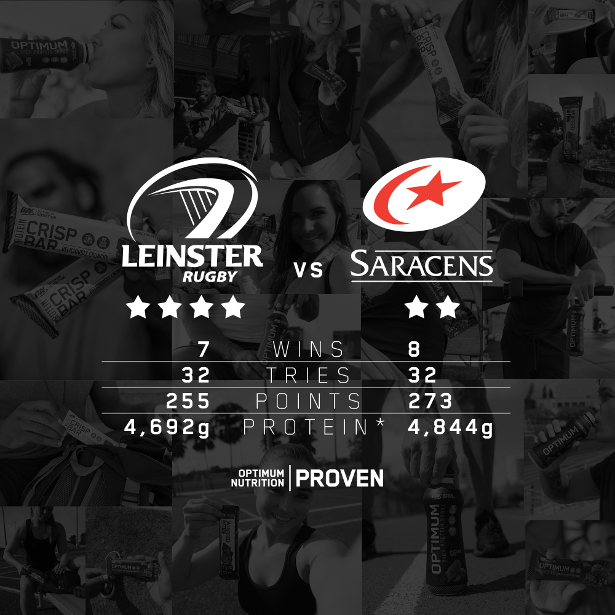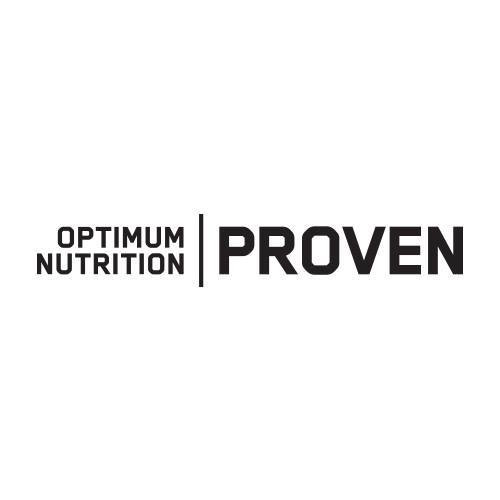Two best clubs in Europe have one thing in common, they’re powered by Optimum Nutrition… Interview: Optimum Nutrition caught up with Performance Nutritionists George Morgan of Saracens and Daniel Davey of Leinster pre European rugby final.
Optimum Nutrition, makers of the world’s number 1 whey protein are proud to supply nutrition to Leinster and Saracens rugby clubs. Find the ranges that fuel Europe’s best teams here: www.optimumnutrition.com

FACEBOOK | TWITTER | INSTAGRAM
- What are the specific Nutrition Considerations for a Rugby Player versus the average person
With any athlete you need to consider their energy requirements. A rugby player will have different needs depending on the energy requirements on that day depending on if it’s a game day, training day or rest day. On a average day, a rugby player at Leinster will be looking to meet those energy levels over 6 meals in the day with the average player looking to consume around 3,500 calories a day with the larger players taking on up to 4,5000 a day.
Energy intake and the spread of nutrients are important so our players are fuelled and recovering as best they can. But the most important thing for us is the timing of those meals so that the players are recovering quickly, as they might be doing two sessions in the day.
This is obviously vastly different to the average person who would be recommended the standard 3 meals over the course of the day taking on around 2,5000 calories.
- Do you have specific approach to nutrition at the club?
The energy intake, the macro-nutrient intake, nutrient timing and of course supplement intake will make up the core nutrition strategy in a high-performance environment.
What is really special about Leinster rugby is there is a hugely positive culture about food preparation and about how important food is for performance. Our players really buy into this approach and it’s part of what they see being a professional at Leinster is all about.
- Do you think rugby players have an enhanced knowledge of nutrition?
Without a doubt. They can’t perform to the level they do without having an in depth understanding of nutrition needs and requirements.
The players are encouraged to make their own smoothies and breakfasts along with protein balls and snacks and they really enjoy that experience. It’s become a huge social aspect of what they do every day at the club.
They also value how they look so there is definitely a raised awareness in seeing day to day benefits.
- What are the different requirements for fuelling a training day compared to the final?
The big difference is the need for carbohydrate intake. If they are doing a demanding, high intensity session then more carbohydrate will be required which they will get from things like fruit, porridge, potatoes etc.
We’ve seen a big change in culture and tradition around match day. Our players are eating less on game day, with smaller lighter pre-match meals. There is now more emphasis on the pre-game day fuel up period.
- Does a player’s position on the field alter their nutrition plan at all?
The difference in player weight ranges from 80kg for a scrum half to some of your props which can be 125kg so the position definitely affects nutrition in terms of calories and macro-nutrient needs.
A scrum half for example will be covering high intensity, high volume, high distance so carbohydrate needs will be more significant and contribute greater to energy intake. Whereas larger players will have bigger contribution from healthy fats and as much as 250g of protein.
- Are there any vegetarian or vegan players you look after? If so how do you ensure they get enough protein?
We have one pescatarian at Leinster but there are plenty of ways they can get enough protein. This will often be through education and trial & error with recipes along with having the catering facilities that means their needs are matched. They understand that they can get higher protein intake from plant-based foods such as beans, lentils, tofu, nuts and seeds along with the Optimum Nutrition Gold Standard Plant protein supplement.
- What do your players eat after a match … what will they eat after the final
Typically, they would have a recovery shake in the form of the Optimum Nutrition Gold Standard 100% Whey along with some added carbohydrate and nuts. Then afterwards they would have a nutritious meal which would be something like a baked potato and salmon with some vegetables.
…After the final however, it will hopefully be a few celebratory beers and pizza.
- In your view Is there such a thing as a ‘superfood’?
There are foods with very different nutrient values and foods with varying antioxidants and minerals but I would never categories any food as a superfood and put it above another. Variety is the most important thing.
- Would you recommend the Keto diet for athletes or people strength training?
No. Keto has its place for certain health conditions but there is not enough evidence to suggest it improves performance.
Interview between: Optimum Nutrition and George Morgan, Performance Nutritionist, Saracens Rugby
- Game-day diets: what will the players be eating on Champions Cup final day?
Come game day it will be important for the players to eat plenty of carbohydrate rich foods with meals and snacks to aid with match day performance. We want to keep protein regular but not too high and sources of fat low to reduce impacts on digestion.
We will also be mindful sources of fibre to reduce any risks of GI discomfort. Our goal is to ensure as much fuel gets into the players as efficiently as possible
We will also encourage the players to hydrate well and include some electrolytes to prepare for the salt lost in sweat during the game.
Game day diet might look like this:
Breakfast: Large bowl of porridge with milk, banana on a white bagel with honey. Diluted fruit juice or a banana-based smoothie.
Mid-morning snack: Sliced turkey wrap, Greek yogurt with red berries. Water with electrolyte tablet or an Optimum Nutrition Whey protein fruit smoothie.
Pre match meal: Sliced Chicken breast, Spaghetti with tomato sauce, Sweet potato. Scotch pancakes with syrup and berries and water with electrolytes.
Pre-game in the changing room will look like: Optimum Nutrition Amin.o. Energy, Jelly babies, banana, sliced fruit bread and water.
Post-Game: Optimum Nutrition Gold Standard 100% Whey protein shake with a fruit smoothie containing tarte cherry juice.
Post-game meal: Beef chilli with potato wedges, rice, flat bread and green salad Water with electrolytes.
Pre-bed Snack of Optimum Nutrition Gold Standard Casein with milk and banana smoothie.











